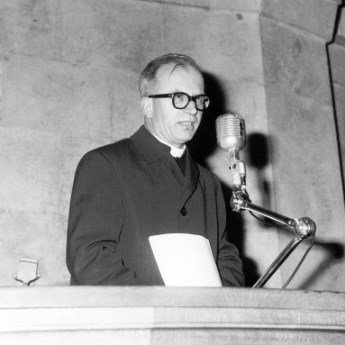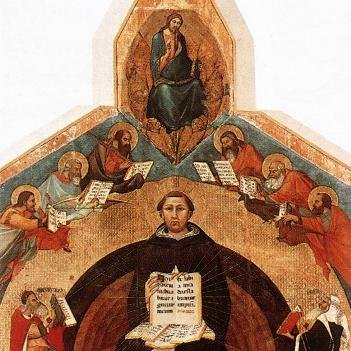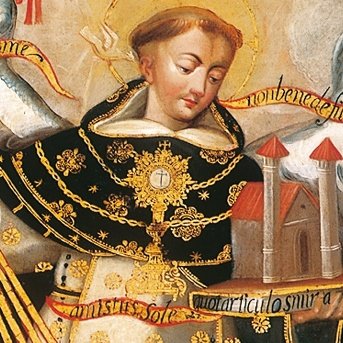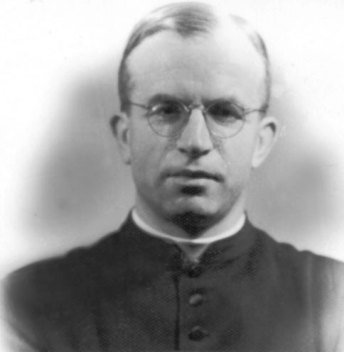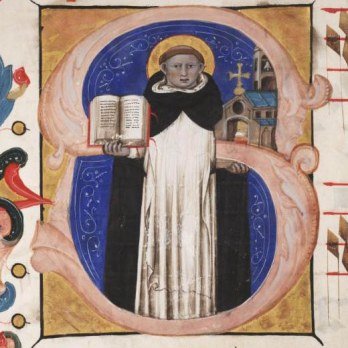En la casa de formación mayor “San Vitaliano Papa” (Montefiascone, Italia), se desarrolló una nueva edición de las Jornadas Tomistas. En ellas, estudiantes y profesores se avocaron al estudio de la cuestión de la libertad en la obra de Santo Tomás de Aquino y en la interpretación del P. Cornelio Fabro. Compartimos algunas de las exposiciones a cargo de los profesores (las exposiciónes están en italiano; para la traducción se pueden usar los subtítulos automáticos de youtube): P. Lic. Ignacio …
«Voces en la Enciclopedia Católica» – nueva obra del P. Cornelio Fabro
Obras completas, vol. 39 (ed. P. Dr. Marcelo Lattanzio). Este volumen recoge las ciento trece entradas escritas por Cornelio Fabro para la Enciclopedia Cattolica, propiedad artística y literaria del Ente per l’Enciclopedia Cattolica e per il Libro Cattolico de la Ciudad del Vaticano, cuya parte editorial estuvo a cargo de la Casa Editrice Sansoni (Florencia), y se publicó en 12 volúmenes entre 1948 y 1954. Ver el índice de la obra con todas las voces Para comprar el volumen acceder …
Scholastic and modern formalism: a continuous path down
[Exposition in the Thomistic Studies 2014: ens-esse; the return to the fundament] This work is about Modern formalism or essentialism. After having seen some historical works about the sources of Saint Thomas Aquinas’ thought, these two works about scholastic and modern formalism are focused on showing a wrong understanding of the primacy of the actus essendi in the ens. The main thesis I want to show has three branches: 1) First, there is a continuous path of the forgetfulness of …
The intensive hermeneutics of Thomistic philosophy: the notion of participation, by Cornelio Fabro (VII)
VII Whereas Platonic vertical participation is actualized merely as imitation of the Idea and hence as a fall, as it were, into non-being and the phenomenon, the Aristotelian horizontal causality is like an endless repetition of universal essence in the singulars. The result is that both theories tend to emphasize formal univocity. In contrast, the Thomistic notion of participation, founded in esse as supreme intensive act, makes it possible to pass from finite to Infinite Being through analogical discourse, which …
The intensive hermeneutics of Thomistic philosophy: the notion of participation, by Cornelio Fabro (VI)
VI To the extent that participation allows one to conceive the created universe in the complexity of its natures as a reflection of divine ideas or exemplars, one may speak of participation by similitude (per similitudinem) in the transcendental order according to a relation of dependence of the finite on the Infinite. This has been expressed by Boethius in the following terms: “From these forms, which are beyond matter, stem the other forms that are in matter and make up …
The intensive hermeneutics of Thomistic philosophy: the notion of participation, by Cornelio Fabro (V)
V From the preceding discussion it becomes clear that in Thomistic speculation the notion of participation expresses the ultimate point of reference both from the static viewpoint of the creature’s structure and from the dynamic viewpoint of its dependence on God. This notion takes from Platonism the idea of exemplar relationship and absolute distinction between participating being and Esse subsistens, and from Aristotelianism the principle of real composition and real causality at every level of participated, finite being. To assert, …
The intensive hermeneutics of Thomistic philosophy: the notion of participation, by Cornelio Fabro (IV)
IV St. Augustine developed his philosophy outside the Proclian line of thought mentioned above. Not knowing the works of Aristotle, he could not attempt a dialectical synthesis of the two philosophers; instead he directly raised Plotinian Neoplatonism to the highest level of Christian thought. Thus his notion of participation aims to provide a basis for the “catharsis” of the soul in its [461-462] approach to the divine Ideas contained in the eternal Word “the vision of which [the ideas] makes …
The intensive hermeneutics of Thomistic philosophy: the notion of participation, by Cornelio Fabro (III)
III To the Platonic doctrine of participation based on imitation and transcendence, Aristotle opposed the immanence of the form in sensible substances and the causality of the individual singular in the process of natural becoming. At this point Greek thought did not seem to offer any way out of the impasse in which it found itself. Indeed, if Aristotle was right in vindicating the reality of sensible substance, this latter could not be viewed by him as the perfect substance. …
The intensive hermeneutics of Thomistic philosophy: the notion of participation, by Cornelio Fabro (II)
II In ordinary usage participation has a sociological meaning that can be extended to include all relations pertaining to the union of the members of a collectivity for the objectives and purposes that concern them in one way or another. This kind of participation may refer to knowledge or will, sentiment or activity, as the following expressions indicate: to participate in news, a happy or unhappy event. Such applies not to any person whatsoever but to one who can or …
The intensive hermeneutics of Thomistic philosophy: the notion of participation, by Cornelio Fabro (I)
[The review of metaphysics, March 1974, volume XXVII, Nº 3 issue Nº 107, 449-490] I [449] In the platonic tradition, the term “participation” signifies the fundamental relationship of both structure and dependence in the dialectic of the many in relation to the One and of the different in relation to the Identical, whereas in Christian philosophy it signifies the total dependence of the creature on its Creator. The term participation has played an extensive role in Patristic and medieval speculation. …
San Juan Pablo II y Santo Tomás de Aquino (5), P. Pablo Trollano IVE
B. Dignidad de la Persona Humana. La preocupación por el hombre y la dignidad de la persona humana ha sido un tema continuo en prácticamente todo el magisterio de Juan Pablo II. Son muy numerosos a este respecto los estudios acerca de la filosofía llamada «personalista» de Karol Wojtyla-Juan Pablo II, con muy variadas hipótesis y conclusiones, no pocas de ellas poniendo en duda la compatibilidad o permanencia dentro del «tomismo» de algunas de sus tesis. Sin embargo, en cuanto …
Modernismo, (Enciclopedia Cattolica) por Cornelio Fabro
Enciclopedia Cattolica, vol. VIII, Sansoni, Firenze 1952, coll. 1188-1196. I. Génesis histórica. II. La Encíclica «Pascendi». III. Índole doctrinal. IV. Errores principales. 1. Modernismo bíblico. 2. Modernismo teológico. 3. Modernismo filosófico. V. Crítica. Bibliografía. — Orientación heterodoxa delineada entre los estudiosos católicos a fines del siglo pasado y en los primeros años del presente, que se proponía renovar e interpretar la doctrina cristiana en armonía con el pensamiento moderno. El término «modernismo» aparece oficialmente por primera vez en la encíclica …
Para un proyecto de Filosofía Cristiana, por Cornelio Fabro
1. Prólogo esencial del hombre esencial 2. Los pilares de la filosofía cristiana 3. El fundamento de la existencia de Dios 4. La filosofía cristiana como encuentro de la razón con la religión 5. El pecado en el origen del mal de la historia humana 6. El drama existencial de la historia de Israel 7. Las pruebas filosóficas del Cristianismo 8. Conclusión: la síntesis existencial de la filosofía cristiana 1. Prólogo esencial del hombre esencial No hay duda de …
Santo Tomas frente al desafío del pensamiento moderno (7), por Cornelio Fabro
[Capítulo I, Santo Tomás frente al desafío del pensamiento moderno (7), Las razones del Tomismo (EUNSA 1980, 15-45). Última parte]. Hacia un tomismo esencial Un «tomismo esencial» trasciende cualquier sistema cerrado o «figura histórica» particular, comprendiendo también la de Santo Tomás en los puntos en los que ésta está sometida a los límites de la cultura de su tiempo; con mayor razón éste debe incluso superar el límite histórico del «sistema» de su Escuela, siempre que ésta hubiera desviado en algunos aspectos el …
Santo Tomas frente al desafío del pensamiento moderno (6), por Cornelio Fabro
[Capítulo I, Santo Tomás frente al desafío del pensamiento moderno (6), Las razones del Tomismo (EUNSA 1980, 15-45)]. Tomismo y Escolástica Pero esto no es todo, nos parece: queda aún el reverso de la medalla, el lado objetivo, es decir, las deficiencias reales de la Escolástica y del mismo tomismo histórico. De hecho, y antes que nada, ¿qué filosofía (y teología) se ha enseñado en muchos seminarios y tal vez también en no pocos institutos universitarios superiores? Una doctrina ecléctica e incolora, hecha …
Santo Tomas frente al desafío del pensamiento moderno (5), por Cornelio Fabro
[Capítulo I, Santo Tomás frente al desafío del pensamiento moderno (5), Las razones del Tomismo (EUNSA 1980, 15-45)]. Pensamiento cristiano y pensamiento tomista No se piense que la acción de los Papas a favor de Santo Tomás haya tenido sin más la adhesión indiscutida e integral de las escuelas católicas, tal y como los Decretos indicaban con insistencia y como daban a entender también algunas intervenciones enérgicas, sobre todo de León XIII y de San Pío X. Baste un ejemplo: San Pío X …
Santo Tomas frente al desafío del pensamiento moderno (4), por Cornelio Fabro
[Capítulo I, Santo Tomás frente al desafío del pensamiento moderno (4), Las razones del Tomismo (EUNSA 1980, 15-45)]. 3. Tomismo del futuro Santo Tomás, pensador «esencial» Está claro que los grandes del pensamiento, como los verdaderamente grandes de la vida, no tienen por qué temer por el futuro : somos nosotros, tomistas o antitomistas, los que debemos ser muy cuidadosos en los pasos que damos, y medir nuestros juicios de aprobación o desaprobación para no poner de manifiesto nuestra poca capacidad y mediocridad. …
Santo Tomas frente al desafío del pensamiento moderno (3), por Cornelio Fabro
[Capítulo I, Santo Tomás frente al desafío del pensamiento moderno (3), Las razones del Tomismo (EUNSA 1980, 15-45)]. Santo Tomás frente al desafío de Heidegger A estas alturas todos ven que lo que pareció, para mucha historiografía tradicional poco profunda y miope, una lucha de escuelas medievales y causa de discusiones conventuales sin fin, la recordada distinción de essentia-existentia, se encuentra, en cambio, al centro de la determinación de la relación del hombre con la libertad y del fundamento último de ésta: por …
Santo Tomas frente al desafío del pensamiento moderno (2), por Cornelio Fabro
[Capítulo I, Santo Tomás frente al desafío del pensamiento moderno (2), Las razones del Tomismo (EUNSA 1980, 15-45)]. 2. Dos principios: el acto de pensar y el acto de ser Realismo e inmanentismo Reducidos a la fórmula más radical, el realismo y el inmanentismo se oponen no solamente como afirmaciones o negaciones en abstracto, sino en la determinación concreta de la relación originaria de la conciencia con el ser: en cuanto que el inmanentismo afirma el ser de conciencia y el realismo la …
Santo Tomas frente al desafío del pensamiento moderno (1), por Cornelio Fabro
[Publicaremos en las próximas entradas, Dios mediante, este capítulo de C. Fabro en el libro Las razones del Tomismo (EUNSA 1980, 15-45), en el cual colaboran también F. Ocariz, C. Vansteenkiste, y A. Livi.] Capítulo I Santo Tomás frente al desafío del pensamiento moderno Ha pasado ya un siglo desde aquel 4 de agosto de 1879, cuando León XIII dirigía al mundo católico la Encíclica Aeterni Patris, con la cual proponía la doctrina de Santo Tomás como pauta en los …
- Page 1 of 2
- 1
- 2




